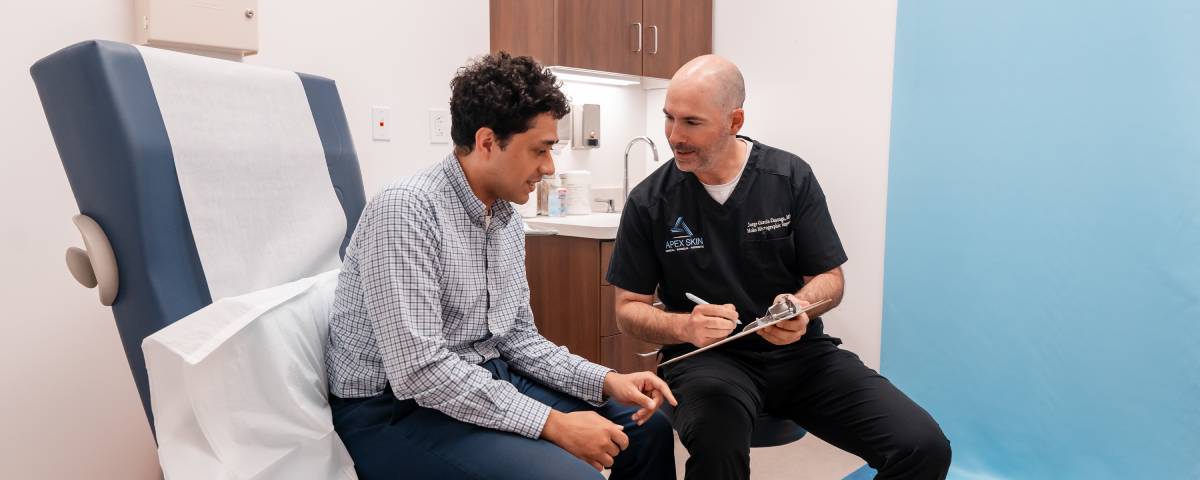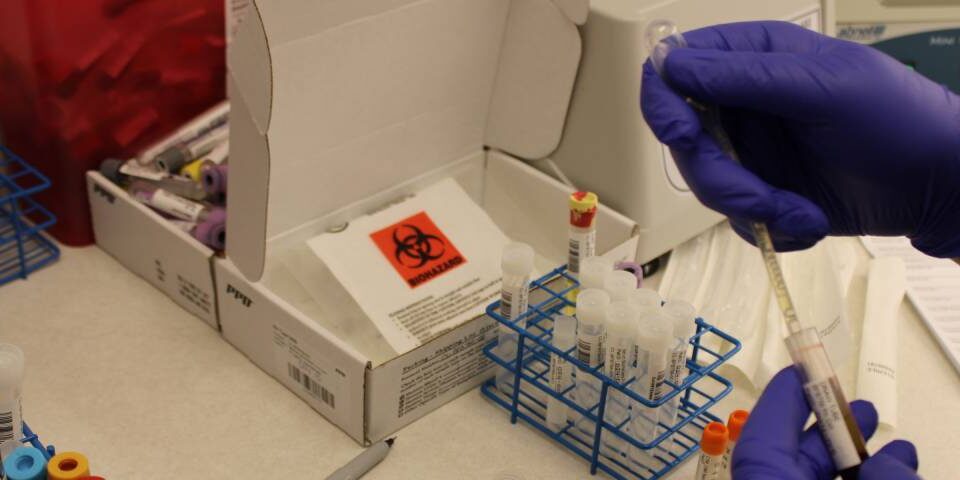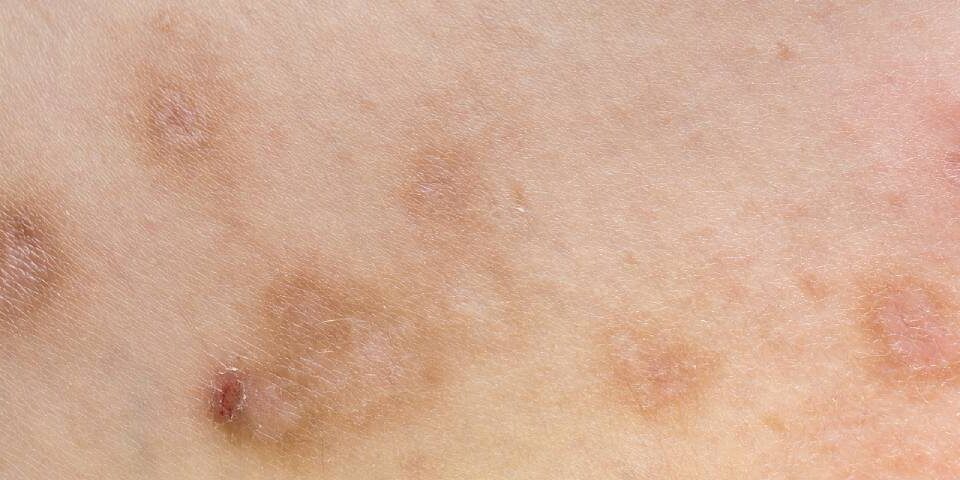
Inside the Itch: Exploring Chronic Urticaria and Innovative Treatments
February 13, 2025
The Psychological Impact of Skin Conditions—and How Dermatology Clinical Trials Can Help
April 16, 2025Here at Apex Clinical Research Center, it’s not an overstatement to say that we think the folks who participate in clinical trials are heroes. We are honored to work with many amazing patients who have suffered from a wide range of skin conditions for years to pioneer new, better ways to screen for, diagnose, and treat those conditions. Their participation in our dermatology clinical trials not only helps them find new avenues of relief that truly improve their quality of life, but they’ve also taken steps to improve the lives of many more patients around the world. Skincare research like ours isn’t just skin deep.
As the body’s largest and only organ exposed to the outside world, it acts as a window and a mirror into the body’s systemic health situation. Discovering new ways to treat skin conditions can help us understand more about overall health, and how to improve it. Also, when people suffer from painful, itchy, persistent, and even dangerous skin conditions, it affects their lives, and their families' lives, often very deeply.
The dermatology research we do here at Apex Clinical Research Center makes life better for real people like you every day.
The Role of Clinical Trials in Dermatology
First, let’s talk a little bit about what a clinical trial is, and how important they are in every field of medicine, specifically, within the realm of dermatology research.
Laboratory Testing
The first thing to understand is that dermatology clinical trials are a tightly controlled, supervised, and deeply researched process. Scientists constantly run research studies in laboratories, always using the scientific method, under strict protocols. Careful documentation and study during these early phases will eliminate things that don’t work while revealing other options that may work but require further investigation. The most promising potential dermatology treatment options then require test treatments with the participation of human patients.
Developing a Detailed Protocol for Dermatology Clinical Trials
Between the initial laboratory testing that identifies a promising treatment and testing it on humans, an entire protocol to keep those patients safe while gathering critical dermatology research needs to be developed. Usually, pharmaceutical or medical device companies sponsor clinical research. They work with researchers to develop these protocols. They have a medical monitor who is the go-to medical person for the study, and this medical monitor oversees the entire project. Once the product to be tested is ready to be introduced to human subjects, the sponsor contacts clinical research centers to recruit research physicians to run clinical trials with their product. Each participating research center will have a principal investigator (PI) who is responsible for the integrity of the study.
In other words, the PI uses the protocol developed by the sponsor to determine who is eligible, how long the study will run, etc. Most studies have multiple research centers testing a product and the protocol is identical for every center to ensure the integrity of the data collected and the safety of the patients who volunteer. Each center has a PI responsible for conducting the study according to the sponsor's protocol.
Dermatology Research Begins—in Phases
Once the dermatology research plan has been approved, the research team puts out a call for patients who may want and be eligible to participate in clinical trials. Patients may then contact the dermatology research team and schedule an initial consultation. During that appointment, the team will ask detailed questions about your diagnosis and medical history to determine if you are eligible to participate. Eligibility criteria usually include:
- An age requirement: Typically, you must be aged 18 or older.
- A diagnosis: For example, if the study drug is intended for use on psoriasis, you will already have to have a psoriasis diagnosis from your dermatologist.
- Additional criteria may include things like:
- The severity of your condition
- The condition did not respond well to other treatments
- The absence of other conditions that may interfere with the study drug
- Your availability to participate regularly (often weekly, sometimes more, sometimes less, depending on the study) throughout the course of the study.
The Apex Clinical Research Center team will also describe in detail what you can expect during the clinical trial, and what the phases are. Many clinical trials are done in phases, and a full clinical trial, from start to finish, can take a year, sometimes even longer. If you are selected to participate, your health and safety will be closely monitored throughout the process. Also, the costs of all the care and the study drug are covered at no cost to you. Many patients find that they are also eligible for compensation for study-related time and travel expenses.
What to Expect When Participating in Skincare Research Clinical Trials
Participating in dermatology clinical trials goes beyond what you would normally experience as a patient in other dermatology care settings. For example, if you have already been receiving care for an eczema diagnosis, you probably see your dermatologist a couple of times a year for check-ins and personal care using already FDA-approved treatments and prescriptions that have previously gone through clinical trials and are now available to the general public. In other words, patients who came before you participated in clinical trials to help develop the drugs that provide relief for so many people today.
During clinical skincare research, you will have more frequent check-ins to monitor your condition and your health in detail. This has two main purposes: first, to ensure your safety and comfort throughout the process. Second, to gather extensive data that helps us deeply understand whether and how well the study drug works. If you participate in clinical trials, you will receive a level of care and attention that you have never even imagined receiving before because of the depth of the data that must be gathered to learn whether the drug works and to ensure your safety.
The Unexpected Benefits of Dermatology Clinical Trials
Sometimes, this detailed and extensive level of care leads to additional and unexpected discoveries for individual patients. Here at Apex Clinical Research Center, our deep levels of care have improved patients' lives for even seemingly unrelated medical conditions. For example, we have discovered many comorbid conditions (other health conditions that were actually related to or systemically connected to the skin condition under observation). This includes conditions like diabetes, hypertension, and hyperlipidemia that patients did not realize they had before coming to participate in one of our clinical trials.
“We screened a patient who had a heart arrhythmia that he was unaware of that needed a pacemaker,” says one of Apex Clinical Research Center’s scientists. “So, in addition to treating the conditions that are being studied, we can direct patients to the appropriate providers to improve their health in general. These diagnoses are all revealed because of the extensive amount of testing that is part of participating in clinical trials.”
Why Your Participation in Clinical Trials Matters So Much
Joining a skincare research clinical trial is one way that you can help discover scientific advancements that benefit society. If you have struggled with a painful, irritating, itchy, or embarrassing skin condition, you know from personal experience how it impacts your quality of life. Skin conditions don’t only cause physical discomfort. They can also cause mental, emotional, and social difficulties. All of these things are interconnected. Helping doctors and scientists discover new treatments that provide more relief can help you and others in your situation live a better, happier life. There are also personal benefits:
- If you have been struggling with a skin condition for years, you can try newly discovered treatments that can bring a welcome level of relief.
- Participating in clinical trials gives you a deeper window into your overall health that can help you stay healthier and get the care you need, even for other conditions.
- A dedicated team of professionals will take excellent care of you from beginning to end.
- You have the opportunity to be a pioneer in discovering treatments that will bring relief to many other people too.
- Your participation can advance dermatology science and care for the future.
- Clinical trials are incredibly helpful for patients who haven't found relief from the standard treatments currently available.
- Clinical trials can also give hope to patients who don’t have medical insurance or who have insurance with poor drug coverage because the study costs are typically covered for study participants.
Benefits to Medical Science
Every single medication and skincare treatment that is currently available on the market has already undergone clinical trials with patients who decided to participate to advance medical science. The very study designs and data gathered throughout those processes have enabled dermatologists to find better, more effective diagnostic methods and skincare treatments that make life better for millions of people, even saving lives. For example:
Mohs Skin Cancer Surgery
In the 1930s, Dr. Frederic Mohs’ research into skin cancer developed a surgical technique that gives skin cancer patients the highest chance of cure. Research refinements and clinical trials on this procedure over the years give Mohs skin cancer surgery patients a 98% cure rate with less scar tissue.
This and every other effective medical and dermatological treatment today has gone through clinical trials.
Impact on Future Healthcare
Today’s clinical trials can shape the future standards for dermatological treatments and healthcare policies that make life better for millions of people. As the environment for skin diseases increases globally, doctors, scientists, and patients need to take an active, ongoing role in advancing research into skin diseases including:
- Acne (affects 50 million people in America every year)
- Eczema (affects 1 in 10 adults, and 1 out of 5 children in America)
- Alopecia, or hair loss, of some type (affects 80 million Americans)
- Psoriasis (affects almost 8 million Americans)
- Skin Cancer (9,500 Americans are diagnosed with some form of skin cancer every day)
Challenges and Considerations
One of the biggest challenges that patients considering whether to put their hat in the ring for a dermatology clinical trial is safety concerns. This is understandable, and Apex Clinical Research Center goes the extra mile to make sure our clinical research participants are safe. We fully outline everything we know about the risks and benefits for each participant, and we closely monitor patients through every single step of the process to make sure each patient is safe, supported, and cared for at the highest levels. We adhere to stringent clinical and ethical standards in every trial to ensure the least amount of risk and the highest amount of benefit for each participant, and for the future of dermatology research that can impact so many lives for the better.
Find Out More About Becoming a Pioneer in Skincare Research
If you have ever experienced relief from any healthcare concern in your life, you have the patients who participated in clinical trials to thank for that relief. Clinical trials are the key pathway for discovering new, better, more effective, less side-effect-inducing treatments for all kinds of health conditions, including skin conditions.
If you are interested in participating in a clinical trial at Apex Clinical Research Center, please take a look through our list of current study conditions for which we are recruiting clinical trial participants. Then contact us and schedule a consultation to find out if you are eligible to participate. You could be a hero for yourself, your family now and in the future, and millions of others struggling with the same condition.





